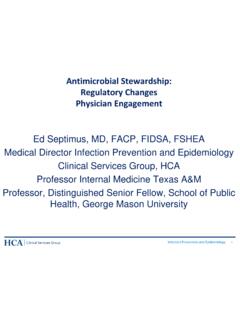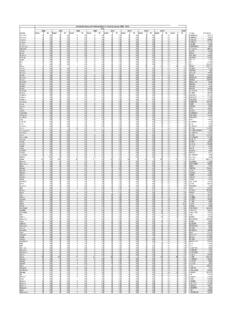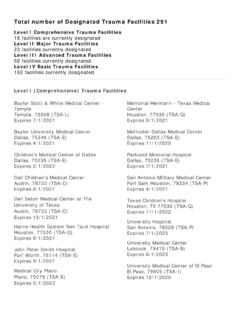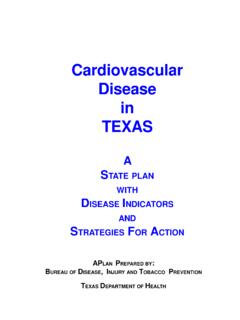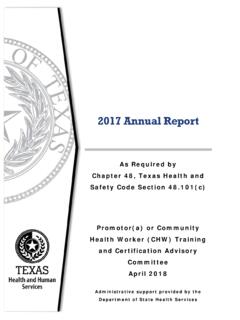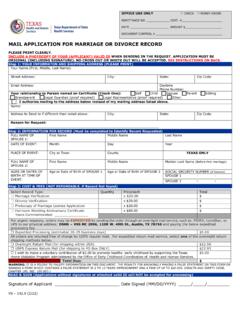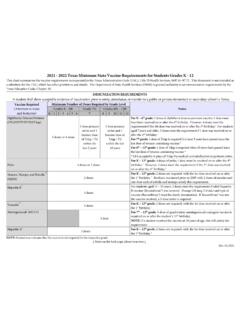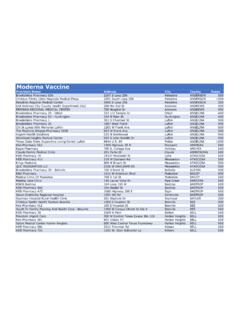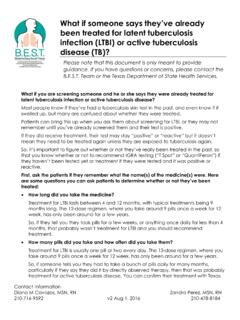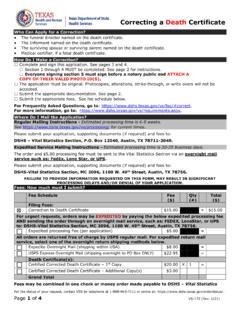Transcription of Texas Food E Rules
1 August 2021 Texas Department of State Health Services Consumer Protection Division Policy, Standards, and Quality Assurance Section Public Sanitation and Retail Food Safety Unit Texas Food Establishment Rules Texas Food Establishment Rules Texas Administrative Code Title 25 Health Services Part 1 Department of State Health Services Chapter 228 Retail Food Establishment This guidance document is meant to consolidate the current Texas Administrative Code, Title 25 Health Services, Part 1 Department of State Health Services, Chapter 228 Retail Food Establishment, known as the Texas Food Establishment Rules (TFER) into a consolidated PDF for ease of use. To access the original text please visit the Texas Secretary of State, Texas Administrative Code. Texas Department of State Health Services Consumer Protection Division Policy, Standards, and Quality Assurance Section Public Sanitation and Retail Food Safety Unit Effective Date: August 8, 2021 Table of Contents Subchapter A.
2 General Provisions 1 Purpose and Regulations 1 Definitions 1 Subchapter B. Management and Personnel 7 Certified Food Protection Manager and Food Handler Requirements 7 Reporting Symptoms and Diagnosis Signage 7 Subchapter C. Food 8 Approved Sources for exotic Game Animals 8 Specifications for Receiving 8 Buffet Notification 9 Donation of Foods 9 Subchapter E. Water, Plumbing, And Waste 11 Source 11 Water Quality Standards 11 Water Distribution, Delivery, and Retention Systems 11 Subchapter F. Physical Facilities 12 Wall and Ceiling Coverings and Coatings 12 Dogs in Outdoor Dining Areas of a Food Establishment 12 Subchapter G.
3 Poisonous or Toxic Materials 13 First Aid Supplies, Availability 13 Subchapter H. Requirements Applicable to Certain Establishments 14 Mobile Food Units 14 Temporary Food Establishments 17 Bed and Breakfast 19 Outfitter Operations 21 Self-Service Food Market 23 Subchapter I. Compliance 26 Facility and Operating Plans 26 Confidentiality, Trade Secrets 26 Construction Inspection and Approval, Preoperational Inspections 26 Performance and Risk Based Inspection 26 Competency of Inspectors and Access 27 Investigation and Control 271 TITLE 25 HEALTH SERVICES PART 1 DEPARTMENT OF STATE HEALTH SERVICES CHAPTER 228 RETAIL FOOD ESTABLISHMENTS SUBCHAPTER A GENERAL PROVISIONS Purpose and Regulations.
4 (a) The purpose of this chapter is to implement Texas Health and Safety Code, Chapter 437, Regulation of Food Service Establishments, Retail Food Stores, Mobile Food Units, and Roadside Food Vendors. (b) The department adopts by reference the Food and Drug Administration (FDA) Food Code 2017 (Food Code) and the Supplement to the 2017 Food Code. (c) The department does not adopt by reference the following sections, paragraphs, and subparagraph of the FDA Food Code, , (C), (A), , , , (B)(1), (B), , , , , 14, 30, , , , , , , , and , and the definitions for accredited program, drinking water, food establishment, game animal, general use pesticide, public water system, regulatory authority, safe material, service animal, and vending machine location. (d) In the event of a conflict, Texas law and Rules in this chapter prevail over the adopted Food Code.
5 Definitions. The following words and terms, when used in this chapter, shall have the following meanings unless the context clearly indicates otherwise. (1) Accredited program--Food manager certification program that has been evaluated and listed by the department and conforms to standards set by the department in of this title (relating to Accreditation of Certified Food Management Programs). (2) Adulterated food--A food deemed to be adulterated as specified in the Texas Health and Safety Code, (3) Bed and breakfast extended--An establishment with more than seven rooms for rent or an establishment that provides food service other than breakfast to overnight guests. (4) Bed and breakfast food establishment--A bed and breakfast that provides food service to customers in addition to its overnight guests. (5) Bed and breakfast limited--An establishment that has seven or fewer rooms for rent, serves breakfast to overnight guests, and is not a retail food establishment.
6 (6) Central preparation facility--An approved and permitted facility or space 2 where food is prepared, stored, and packaged. (7) Code of Federal Regulations (CFR)--Citations to the CFR refer sequentially to the Title, Part, and Section numbers, such as 40 CFR refers to Title 40, Part 180, Section 194. (8) Common carrier--An individual or business that advertises to the public that it is available for hire to transport people or property, including food, in exchange for a fee. (9) Cottage food production operation--An individual, operating out of the individual's home, who: (A) produces at the individual's home: (i) a baked good that is not a time and temperature control for safety food (TCS food), as defined in (b)(13) of this title (relating to Cottage Food Production Operations); (ii) candy; (iii) coated and uncoated nuts; (iv) unroasted nut butters; (v) fruit butters; (vi) a canned jam or jelly; (vii) a fruit pie; (viii) dehydrated fruit or vegetables, including dried beans; (ix) popcorn and popcorn snacks; (x) cereal, including granola; (xi) dry mix; (xii) vinegar; (xiii) pickled fruit or vegetables, including beets and carrots, that are preserved in vinegar, brine, or a similar solution at an equilibrium pH value of or less; (xiv) mustard; (xv) roasted coffee or dry tea.
7 (xvi) a dried herb or dried-herb mix; (xvii) plant-based acidified canned goods; (xviii) fermented vegetable products, including products that are 3 refrigerated to preserve quality; (xix) frozen raw and uncut fruit or vegetables; or (xx) any other food that is not a TCS food, as defined in (b)(13) of this title. (B) has an annual gross income of $50,000 or less from the sale of food described by subparagraph (A) of this paragraph; (C) sells foods produced under subparagraph (A) of this paragraph only directly to consumers; and (D) delivers products to the consumer at the point of sale or another location designated by the consumer. (10) Department--The Texas Department of State Health Services. (11) Drinking water--Traditionally known as "potable water" and that meets the standards set forth in 30 TAC Chapter 290, Subchapter F (relating to Drinking Water Standards Governing Drinking Water Quality and Reporting Requirements for Public Water Systems).
8 Drinking water includes the term "water" except where the term used connotes that the water is not potable, such as "boiler water," "mop water," "rainwater," "wastewater," and "non-drinking water." (12) Event--A unique public gathering at which food products are served and for which an appropriate regulatory authority grants permission, whether by permit, license, or another official written document. (13) exotic animal--Member of a species of game animals not indigenous to this state, including axis deer, nilgai antelope, red sheep, or other cloven-hoofed ruminant animals. (14) Food establishment-- (A) A food establishment is an operation that: (i) stores, prepares, packages, serves, or vends food directly to the consumer, or otherwise provides food for human consumption, such as a restaurant, retail food store, satellite or catered feeding location, catering operation if the operation provides food directly to a consumer or to a conveyance used to transport people, market, vending machine location, self-service food market, conveyance used to transport people, institution, or food bank; and (ii) relinquishes possession of food to a consumer directly, or indirectly through a delivery service, such as home delivery of grocery orders or restaurant takeout orders, or delivery service that is provided by common carriers.
9 (B) Food establishment includes: (i) an element of the operation, such as a transportation vehicle or a central preparation facility that supplies a vending location or satellite feeding 4 location unless the vending or feeding location is permitted by the regulatory authority; and (ii) an operation that is conducted in a mobile, stationary, temporary, or permanent facility or location and where consumption is on or off the premises regardless if there is a charge for the food. (C) Food establishment does not include: (i) an establishment that offers only prepackaged foods that are not TCS foods; (ii) a produce stand that only offers whole, uncut fresh fruits and vegetables; (iii) a food processing plant, including one that is located on the premises of a food establishment; (iv) a cottage food production operation; (v) a bed and breakfast limited as defined in this section; or (vi) a private home that receives catered or home-delivered food.
10 (15) Game animals--Wild animals that are indigenous to this state and not amenable to the Texas Meat and Poultry Inspection Act, Texas Health and Safety Code, Chapter 433, for which the hunter must obtain a hunting license from the Texas Parks and Wildlife Department before hunting animals, such as white-tailed deer, mule deer, pronghorn antelope, and big horn sheep. (16) General use pesticide--A pesticide that is not classified by the United States Environmental Protection Agency for restricted use as specified in 40 CFR or is not limited to use by or under the direct supervision of a certified applicator licensed by the Texas Department of Agriculture or by the Texas Structural Pest Control Service as applicable. (17) Group residence--A private or public housing corporation or institutional facility that provides living quarters and meals. The term includes a domicile for unrelated persons, such as a retirement home, correctional facility, or a long-term care facility.
